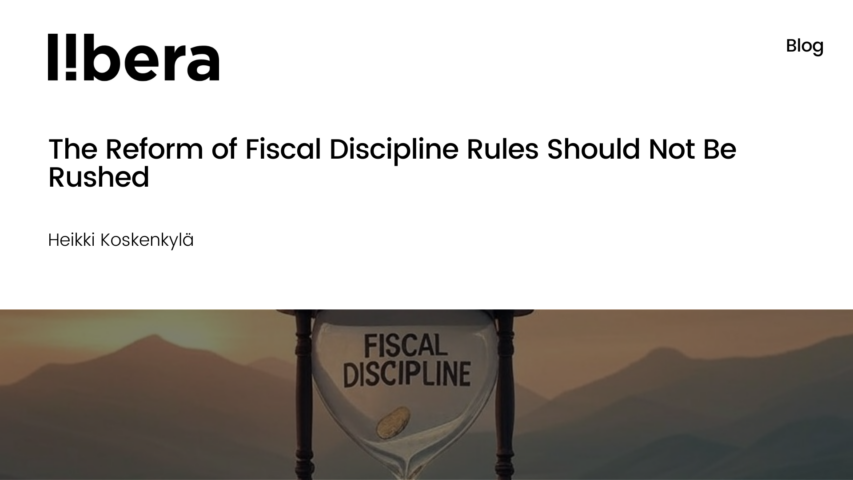The Reform of Fiscal Discipline Rules Should Not Be Rushed

The Reform of Fiscal Discipline Rules Should Not Be Rushed
Heikki Koskenkylä // 13 January 2022
Fiscal Rules of the European Union
Olaf Scholz, the new German Chancellor, visited French President Emmanuel Macron on 14 December to discuss questions regarding the EU. Macron attempted to persuade Germany to reform the fiscal rules of the Union. Reforming the Stability and Growth Pact was a central question. Macron wants to make the rules more flexible, increase the amount of shared debt and create new common funds. In addition, for years he has proposed a common Eurozone budget, which would exist alongside the EU budget.
Fiscal rules of the EU were temporarily frozen when the pandemic started. According to the rules, debt could only amount to 60% and the budget deficit to at most 3% of gross domestic product. Many EU countries significantly exceed these limits now. The ratio of debt to GDP of several member states is already above 100% and debt seems to keep on growing.
Especially Italy, France and Eastern member states want quick reforms of the debt and deficit rules. In addition, they have a fascination with increasing common debt, which in practice means issuing more eurobonds. In this case, they would not have to bear their debt, because it would be taken on by the Commission. In the end, common debt is borne by member states together. Economists have supported the use of eurobonds in Finland as well. They see eurobonds as a useful risk-free bond for capital markets.
The Risks of Reform
However, many research institutes have warned against reforms carried out too hastily. This has included the Bruegel Institute, the Center for European Policy Studies (CEPS) and several German research institutes (see Der Spiegel). Institutes have begun to warn against excessive flexibility of fiscal and debt policy in particular. This could directly lead to unruly fiscal policy and excessive debt in member states. The goal should be a controlled reduction of debt levels.
Research institutes have also warned of the uncertainty of economic development. A high risk of economic decline exists, even while inflation remains high. This leads to the dangerous possibility of a cycle of stagflation, characterised by slow growth and high inflation, as occurred in the 1970s.
Inflation in the Eurozone is already above four percent and as high as five percent in Germany. The European Central Bank (ECB) may be forced to raise interest rates, which could lead to big problems in excessively indebted countries. Their fate may lie in debt restructuring, which could lead to a panic in capital markets.
The French Presidency of the Council of the European Union began this year. We can expect tough negotiations on the reform of the Stability and Growth Pact. Northern and Southern member states oppose each other on this. The Finnish government has not even begun discussions on these reforms. Instead, the government has made a row of how the stimulus package is a one-off thing in a completely unrealistic fashion. Have we again become driftwood in reforms of the EU and complacent in the increase of common responsibility that the Commission and several member states are planning? Under these circumstances, the only outcome for Finland is the increased role of a net payer.
No Increase to Common Responsibility Under Current Monetary Policy
A major threat to the EU and Eurozone is the complete ineffectiveness of market discipline. Without it, member states can excessively increase their debt almost without a risk. Monetary policy of the ECB and especially quantitative easing (QE) has undermined the effectiveness of market discipline.
The ECB has bought a tremendous amount of bonds from member states and companies. This policy has kept interest rates of excessively indebted countries low. The interest rates of Italy, Greece and several other countries have been below one percent for a long time. Taking into account the high debt ratios of these countries, interest rates should be somewhere around 5-10%. This would inevitably lead them to debt restructuring or even bankruptcy.
If the ECB were to normalise its monetary policy and would be able to stop buying bonds, we could consider some more common responsibilities, and even then, only after thorough consideration. However, in the context of current monetary policy, a massive increase in common responsibilities would lead to a worsening political crisis in the EU and Eurozone and to distorted resource allocation. That is why it must be opposed.
Heikki Koskenkylä is a Retired Doctor of Social Sciences. Formerly Head of the Bank of Finland’s Financial Markets Department, before that the Head of the Bank of Finland’s Research Department.
This article was first published by Libera.
EPICENTER publications and contributions from our member think tanks are designed to promote the discussion of economic issues and the role of markets in solving economic and social problems. As with all EPICENTER publications, the views expressed here are those of the author and not EPICENTER or its member think tanks (which have no corporate view).



